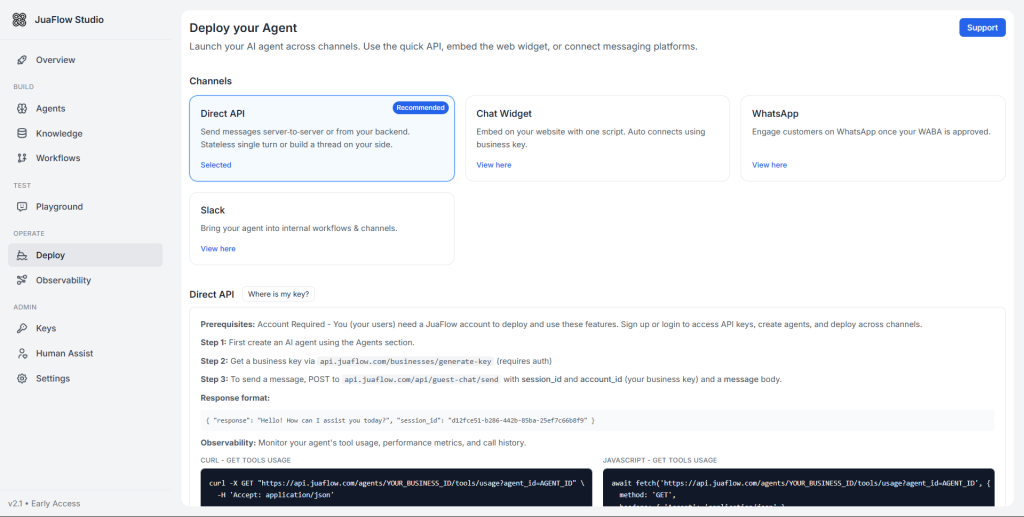Last week, I started a conversation with Pheneas Munene, a passionate Nairobi-based builder. His company, Phindor, which he launched alongside his co-founder, John Maina, in 2018, is working within the part of the African business that has been getting attention over the last few months; the daily work conducted through WhatsApp chats, phone calls, SMS, and small internal task lists.
These repetitive workflows are admittedly complex to manage at scale. Teams answer the same questions multiple times daily and follow up on leads, confirm orders, and escalate issues only when necessary. One person can do this easily, but when a company grows, the work becomes cumbersome.
Phindor built JuaFlow (“Jua” is Swahili for “know”) to solve this problem. The product enables companies to create AI agents that handle repetitive tasks, such as lead qualification messages, delivery confirmations, basic HR requests, and product lookups. When the situation requires judgment, the agent hands it off to a human, Munene said, because this helps keep everything in context.
The aim is not to replace people but to keep work moving, reduce back-and-forth, and prevent tasks from stalling.
Why this matters
Munene and Maina spent seven years building automation for medium-sized organisations. The work was similar across clients, but always built differently. That made every deployment slow and expensive, and with only a few organisations that could justify that cost, scaling across many clients was hard.
The shift occurred when a retail company sought a more cost-effective way to manage high-volume WhatsApp and Instagram conversations. The founders wanted quick replies, simple lead qualification, and a human handoff for cases that required judgment. That solution evolved into Lisa, an artificial intelligence (AI) business assistant that was launched in July 2024. According to Munene, Lisa gained adoption because teams could use it without changing their existing workflows.
As more teams used Lisa, new requests appeared. Some wanted internal task handling while others wanted logistics updates. The idea expanded from messaging automation to general work support. Lisa was re-worked and renamed JuaFlow to reflect this broader use.
“Our client wanted a cheaper way to handle repetitive inquiries automatically without compromising customer experience, like identifying valuable leads and responding instantly,” Munene said. “That project became Lisa, the Intel-l-igent S-tore A-ssistant, which eventually evolved into JuaFlow, a platform that allows teams to build governed AI agents that streamline and speed up customer/employee-facing tasks while under human oversight.”
How the JuaFlow idea formed
The core lesson Phindor drew from consulting work was that AI agents need some kind of structure. If an agent takes actions without checks, minor errors spread through teams. If an agent cannot explain why it acted, no one can adjust it. At the same time, if the agent cannot hand off at the right time, staff lose trust in it.
To avoid these problems, JuaFlow treats each task as a sequence of steps. Before running any action or tool call, the system checks two things: whether the action has the right data, and whether it follows the organisation’s rules. If either check fails, the agent stops and hands the task to a human to avoid silent failures.
According to Munene, this approach is not complex, but it enables companies to integrate agents into real workflows without the risk of runaway actions.
How does JuaFlow work?
Most teams use the Studio, a control room where the team sets up agents. They define identity and tone, add documents and references, and build workflows in a graphical editor. Just like other platforms, like WayaWaya’s conversation AI tool, no code is required to get a working agent.
Each conversation maintains a small “state” record, which tracks the workflow step, the agent’s confidence, and the applicable policies. Short-term memory stays with the active task, while long-term memory is stored separately and retrieved when needed to keep the operations light.
Grounded answers come from a knowledge base that the team maintains. Say, if the agent is confident, it responds. If confidence is low, it asks a clarifying question or hands the query to a human.
Munene added that the AI agent allows a company to add a chat widget to its website, connect to Slack, or integrate the system with internal tools through an API. The system also supports multiple workspaces, so departments or partner accounts can be separated while sharing only what they choose.

What comes next
Despite Lisa launching in July 2024, the company’s first enterprise customer came three months later. Munene claims that from February to July 2025, usage rose from about 15,000 interactions to over 700,000. When JuaFlow launched in July 2025, it went live with 15 companies and about one million recorded interactions.
Munene said pricing for the service is credit-based, where these credits cover messages, knowledge access, and workflow steps. Credits do not expire as long as the account remains active. Enterprise customers, as expected, can negotiate terms.
Many people across the region communicate through voice notes and calls, and many use local languages in daily work. Phindor is working on supporting these patterns as part of its plans. “Our main focus is rebuilding parts of our LLM layer to support local languages and voice. Africa is multilingual, and AI should adapt to that,” Munene said.











